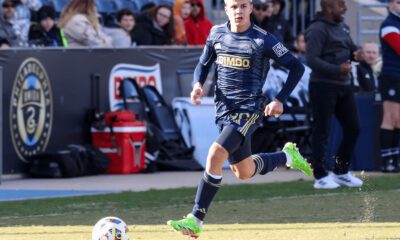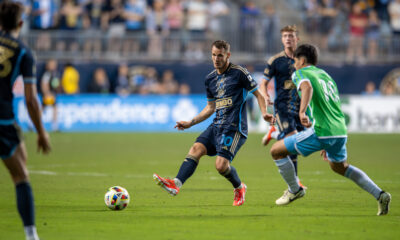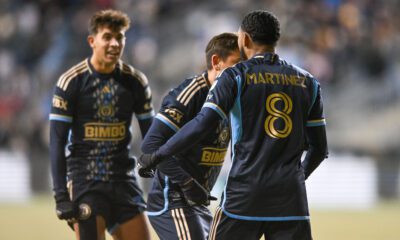Brotherly Game Archive
U.S. U23 Notebook: USA holds on for ugly but important 1-0 win against Costa Rica
Battling rust, altitude and a potent Costa Rica side, the United States U-23 steam held on to a crucial 1-0 victory Wednesday night to open Olympic qualifying
GUADALAJARA, Mexico – Battling rust, altitude and a potent Costa Rica side, the United States U-23 steam held on to a crucial 1-0 victory Wednesday night to open Olympic qualifying.
With the top two teams advancing from Group B to the semifinals, the USA badly needed a result against Costa Rica with Mexico looming. Jesus Ferreira slammed home the match’s only goal in the 37th minute and goalkeeper David Ochoa stole the show with eight saves worthy of his man of the match award.
As is the case with many a USA performance, there’s a glass-half full approach and a glass-half empty. Let’s start with the positives.
The USA won despite having nothing close to its best game. This is the sign of a good team, Given the external factors – most of this roster has been in the offseason for close to six months, the altitude and heat in Mexico significantly affected fitness – a win was going to feel good no matter how it looked.
Ochoa played very well. It wasn’t nine empty saves on the stat sheet, he saved his team’s bacon time and time again when the Costa Ricans launched a barrage in the second half. For outsiders, he seemed like the third keeper on the depth chart, but head coach Jason Kreis acknowledged he won the job in camp and that J.T. Marcinowski and Matt Freese also had slight injuries to start camp. I don’t think this is too concerning for Union fans, but those hoping to see Freese in the Stars and Stripes might have to wait as Ochoa claimed the spot for his own.
On a disconnected and scattershot night, particularly in possession, standouts were few and far between. Sam Vines, who already was pushing the top of the federation’s pool at left back, acquitted himself well and delivered a strong cross on the opener. And of course, Ferreira should get every bit of credit for his clinical finish on a night when his opponents lacked the killer touch in the box.
The center backs were not great in possession, but Justen Glad defended well and ultimately, the back line held on to the three points in the end.
The negatives then. The USA had no ability to kill the game in the second half with possession and gave the ball away at every turn trying to build out of the back. Trying to play possession football at altitude in your first game as a group while clearly not match fit is a tall task. But the USA were lucky they failed at this task so clearly and still came away with the points.
“It’s not surprising to me, because we were asking our team to build up. I think it may have been a different affair if we would have just said OK, every goal kick we get we’re going to take long, we’re going to push into the opponent’s half and fight for second balls, but that’s not part of our DNA,” said Kreis. “That’s not who we are. And so we asked to build up. The majority of the shakiness that I saw came through just mistakes in buildup. So again, I think that’s just a footballing issue.”
The identity of the national team is coming top down from Berhalter’s ideas, which is a good sign of continuity across the federations. It is the question of the cycle of whether the USA can have its cake (play his demanding system) and eat it too (win at the highest level), or revert back to ‘grit and grind’ ball that has defined most of American soccer this century (and beyond).
“Without a doubt, I think that the system that we’re playing is a very difficult one, it requires a lot of energy, it requires a lot of running, it requires the players to be calm on the ball,” said Kreis. “It’s not easy to be a team that’s looking to build out of the back or maintain possession of the game, this isn’t the easy way to play. The easy way to play is to be reactive and counterattack. But again, it’s not our DNA and ultimately we’re going to continue forward with this identity.”
Telling words from Kreis about his and Berhalter’s philosophy. Using words like ‘DNA’ and ‘identity’ are very important when that has not been the way the USA has played. The organization is committed to an overhaul of the play on the field, and while there absolutely is pressure to make an Olympics after missing out on the last two, the team is going to succeed or fail playing its brand of soccer.
Again, the U23 level is a good place for experimentation and Costa Rica is a worthwhile opponent with enough talent to measure yourself against, but not so much that you get routed trying to play your soccer. But goals change games, and who knows what happens if Costa Rica scored first.
Specifically, I was disappointed with Djorde Mihailovic, Jackson Yueill, Mauricio Pineda, and Benji Michel in the starting lineup. Yueill is a player who I really like what he does to settle games in possession, and I give Costa Rica credit for how their gameplan was built to block entry into the defensive midfield and force the center backs to play linebreaking passes. Pineda was less successful than Glad in this area and gave the ball away quite a bit.
Mihailovic had a tough night trying to get on the ball and use his creativity and was largely ineffective. Overall the US midfield wasn’t very connective, but again, the second half featured a lot of tired legs.
This game was yet another reflection of the battle the USA faces through the remainder of this cycle, but I’ll choose to be optimistic. It was sloppy, but the errors, as Kreis said, were controllable in buildup play and should go away to an extent with more experience and more match sharpness. And despite a sloppy performance, the USA won a game that was important to them.
Mexico earned a 4-1 win against the Dominican Republic without clicking in their highest gear, and the El Tri U-23 is still the team to beat in this tournament until proven otherwise. The USA have a game before that rivalry matchup, and Sunday’s clash against the Dominican Republic should allow some rotation and for Kreis to see better execution in the system.




















